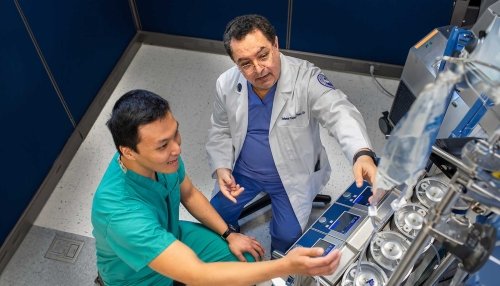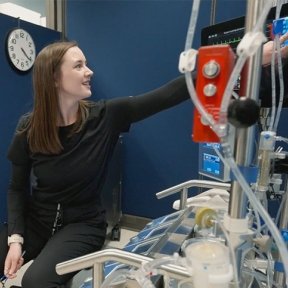A perfusionist is a skilled person, qualified by academic and clinical education, who operates extracorporeal circulation equipment during any medical situation where it is necessary to support or temporarily replace the patient's circulatory or respiratory function. The perfusionist is knowledgeable concerning the variety of equipment available to perform extracorporeal circulation functions and is responsible in consultation with the physician for selecting the appropriate equipment and techniques to be used.
Program graduates are provided with the knowledge and skills necessary to meet the demands that will be placed upon them in an ever-changing field where surgical techniques, cardiopulmonary bypass techniques, and new technologies are constantly being advanced.
Program Highlights
- Education in technological services and skills to support or substitute for patient cardiopulmonary function
- Largest perfusion education program in the country offering a master's degree
- State-of-the-Art Simulation Technology for cardiopulmonary bypass and ECMO
- 100% Three–Year Averaged Placement Results (2021-2024).
Learn More
Learn more about the requirements and find quick links to relevant catalog content to guide you in your application process.
To be considered for admission to the Cardiovascular Science Program, applicants must submit documentation of the following:
- Completion of a bachelor's level or higher degree from a regionally accredited college or university
- Minimum cumulative GPA and science GPA of 2.75 on a scale of 4.00
- Two letters of recommendation
- Completion of prerequisite courses
*Subject to change
Students are encouraged to apply during the Priority or Standard Application Deadlines. Applications received between March 1 and May 31 will be considered on a rolling basis for seats that may be available or placement on the alternate list.
Priority Application Deadline - October 1
Applicants who submit their completed materials on or before October 1 will be given first consideration for admissions and will be notified of the admissions decision on or before January 31. Those who are not accepted in the program at this time will be rolled over into the Standard Application Deadline.
Standard Application Deadline - March 1
Applicants who submit their completed application materials on or before March 1 will be considered for admissions and will be notified of the admissions decision on or before May 31. Applications received after March 1st will be reviewed on a rolling basis.
The Midwestern University Cardiovascular Science Program educates students to be compassionate, competent in behavior skills, clinically proficient and professional members of the cardiac surgery team in the practice of cardiovascular perfusion.
The goals of the program are to:
- Maintain a high-quality perfusion educational program
- Prepare students to be life-long learners, educators, researchers, and leaders
- Assess and incorporate current trends in clinical practice and technology
- Become international leaders in perfusion education
- Maintain appropriate enrollment of students to balance professional supply and demand
- Monitor governmental policies related to our business
The 21-month curriculum leading to a Master of Science in Cardiovascular Science degree is a full-time professional program of seven continuous quarters.
The program begins with three quarters of didactic and laboratory education at the Glendale, Arizona campus. The student is exposed to clinical medicine during the first three quarters through clinical observation at affiliated hospitals in the Phoenix area.
The summer quarter of the student’s second year begins the four-quarter clinical rotation segment held at various affiliated hospitals located across the country. Relocation during clinical rotations will be necessary.
This is a rigorous and demanding program; however, graduates are rewarded with the satisfaction that comes with accomplishment and an excellent start to their professional careers.
*Subject to change
- Female: 52%
- Male: 48%
- Average Age: 26
- Average overall GPA: 3.54
- Average science GPA: 3.42
- Class Size: 44
The board pass rate percentages reflect the average percentage pass rate based on first-time test-takers from 2015-2023.
- MWU graduates: 100%
- National average: 89%
Medical cardiovascular perfusionists are highly specialized professionals responsible for operating heart-lung equipment during surgical procedures, expertly managing mechanical and electronic devices to maintain blood oxygenation and circulation while surgeons perform medical interventions.
Their education encompasses anatomy, physiology, biology, chemistry, physics, and electronics, enabling them to assemble essential equipment for life-saving procedures, while strong teamwork and communication skills are integral to their role.
Career opportunities include:
- Heart-related surgeries
- Blood therapies
- Artificial hearts
- Mechanical circulatory assist
- Cancer therapies
- Heart, lung, heart-lung transplants
- Blood conservation
- ECMO
- Teaching & Research
The Cardiovascular Science Program is accredited by the Commission on Accreditation of Allied Health Education Programs upon the recommendation of the Accreditation Committee–Perfusion Education, 25400 U.S. Highway 19 North Suite 158, Clearwater, FL 33763; phone: 727-210-2350.
Midwestern University is accredited by The Higher Learning Commission, A Commission of the North Central Association of Colleges and Schools (HLC/NCA), 230 South LaSalle Street Suite 7-500, Chicago, IL 60604-1413.
Academic Course Catalog
Explore details regarding your specific College/Program (subject to change).
Hear Our Stories
Emily Breen, M.S., Cardiovascular Science, Class of 2024
“I think I’m getting probably the best Perfusion education that I can here at Midwestern. We are so, so lucky to have the resources that we have.”
Thomas Rath, M.P.S., CCP, Assistant Program Director, Cardiovascular Science
"Our job as professors is to prepare students to hit the ground running when they start their clinical rotations."
Casi Hudak, M.S., Cardiovascular Science, Class of 2024
“The more responsibility I was given throughout my career, from volunteer to nursing assistant to perfusion assistant, the more I wanted to keep discovering my passion and helping others.”

College Stats
Median Salary
The median salary is $152,590.
Employment
100% employment rate.
Board Pass Rate
100% board pass rate (2015-2023).



